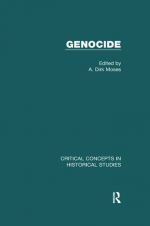Tab Article
Stimulated anew in the 1990s by the slaughter and the so-called ‘ethnic cleansing’ in the former Yugoslavia, and by the horrors of Rwanda, research about and around genocide flourishes as never before. Genocide studies has now accrued a large, sophisticated, and growing, body of scholarly literature. This growth looks set to continue: historians and social scientists are increasingly casting their analytical nets further into the past to investigate whether group destruction and population expulsions have been constitutive of imperial and state expansion over millennia. And, moreover, events such as the Sudanese government’s genocidal counter-insurgency in Darfur suggest that, like war, genocide is a pervasive feature of human society that is here to stay.
Addressing the need for an authoritative and comprehensive reference work to enable users to make sense of - and to navigate around - the ever more complex research corpus, Genocide is a new title in Routledge’s Critical Concepts in Historical Studies series. Edited by A. Dirk Moses of the University of Sydney, it is a six-volume collection of foundational and the very best cutting-edge scholarship.
Genocide is at once a legal, historical, and sociological concept; it is subject to considerable definitional dispute. Volume I (‘The Discipline of Genocide Studies’) brings together the most important and influential thinking on its contested definition (what, for instance, is the relationship of genocide to mass murder and war crimes?). It also gathers work on the various attempts to explain the occurrence of genocide.
The collection is characterized by its broad temporal and geographical coverage; Volumes II (‘Genocide Before Modernity’) and III (‘Colonial and Imperial Genocides’) collect the key research on genocidal phenomena across history and in all parts of the globe. The scholarship gathered here includes work on the Roman Empire, the Spanish conquest of the Americas, and the campaigns against its indigenous peoples by settler colonies in the New World.
Volumes IV–VI of the collection focus on genocide in the twentieth century and beyond. Volume IV is devoted to the Holocaust, and to the Nazi extermination policies more generally, and to Stalin’s genocidal policies in the Soviet Union. Volume V (‘Post-Colonial and -Imperial Genocide’) gathers key research on often overlooked - and sometimes wilfully ignored - episodes. Topics covered here include the partition of India; Nigeria, 1967–70; and the ongoing events in Darfur.
The scholarship assembled in the final volume (‘Humanitarian Intervention, the Prosecution of Genocide, Trauma, and Recovery’) brings together vital research on anti-genocide international law since 1948. It also focuses on the work of international criminal tribunals. Finally, Volume VI also explores the emergence of the controversial ‘duty to protect’ doctrine.
Genocide is supplemented with a full index and other scholarly apparatus. It also includes a comprehensive introduction, newly written by the editor, which places the collected material in its historical and intellectual context. The collection is a landmark reference work and is destined to be valued by scholars and students as a vital one-stop research and pedagogic resource.


